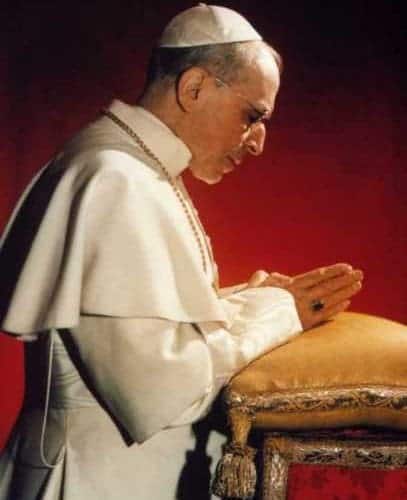“Humility” and “reform” are the buzzwords of our day. The old, ostentatious, triumphalist Church must be demolished; and a new, stripped-down, populist Church must be constructed amidst the rubble of the old. Perhaps, however, our humble reforms should begin with docility. Perhaps, before setting out on our valiant task to overthrow the old and usher in the new, we should linger—humbly—at the feet of our forebears, listening for a while to their advice. The forebears I have in mind are the 19th and early 20th century Roman Pontiffs. In the following series of posts, I will present a number of papal warnings that have either been forgotten or ignored. Perhaps any future reforms should begin by heeding these warnings. If we listen long enough, we may find that true humility yearns more for the restoration of tradition than for its destruction.
Part 1: The Purpose of Marriage
 Pope Pius XII taught emphatically that the primary purpose of marriage is the procreation and rearing of children. The other purposes of marriage are only secondary. For example, the mutual self-giving love between the spouses is not the primary purpose of marriage. It is, rather, at the service of—it exists for the sake of—the procreation and rearing of children. In Pius XII’s own words:
Pope Pius XII taught emphatically that the primary purpose of marriage is the procreation and rearing of children. The other purposes of marriage are only secondary. For example, the mutual self-giving love between the spouses is not the primary purpose of marriage. It is, rather, at the service of—it exists for the sake of—the procreation and rearing of children. In Pius XII’s own words:
“Now the truth is that marriage, as a natural institution, in virtue of the will of the Creator, does not have as its primary and intimate purpose the personal perfecting of the spouses, but the procreation and education of new life” (P. XII Address to Midwives, Oct 29, 1951).
“All personal enrichment, even intellectual and spiritual enrichment, indeed all that there is of the most spiritual and deep in conjugal love as such, has been placed by will of nature and of the Creator at the service of the offspring” (P. XII Address, May 19, 1956).
Marriage has its distinctive features only because it is a relationship created for children. Marriage requires sexual union for the sake of begetting children. Marriage requires exclusivity, steadfast commitment, penetrating intimacy, and permanence, for the sake of rearing children. Other relationships lack these distinctive features precisely because they do not have procreation and rearing of children as their end. The surgeon/patient relationship, for example, does not exist for the sake of procreating. Therefore, the relationship does not require intimacy, permanence, etc.
Pope Pius XII thought that mixing up the priority of the ends of marriage would lead to disastrous consequences. He warned, for example, against the tendency
“which considers the secondary purpose as equally principle, loosing it from its essential subordination to the primary purpose, which by logical necessity would lead to deadly consequences” (P. XII Speech, Oct 3, 1941).
Procreation must remain the primary end of marriage, or the characteristic features of marriage will begin to pull apart. Pius XII reiterated this warning on numerous occasions.
We, however, have not heeded his words. Theology of the Body is today the most prominent exposition of the Church’s teaching on marriage. Most promoters of Theology of the Body treat “total self-giving love between the spouses” as if it were the primary purpose of marriage; and they treat procreation as if it were secondary—as if it existed for the sake of perfecting the love between the spouses. These Theologians of the Body place procreation at the service of the spousal love, rather than, as Pius XII would have it, spousal love at the service of procreation. Other Theologians of the Body treat procreation and spousal love as two equal ends of marriage, neither subordinate to the other (thus ignoring the pope’s warning against treating the ends of marriage as “equally principle”).
Pope Pius XII promised that “deadly consequences” would follow the dethronement of procreation from its place of priority. It is now dethroned. Procreation has been cast down from its place of priority by the secular enemies of Catholic marriage and by Catholic marriage’s most vociferous contemporary defenders. If we take Pope Pius XII seriously, this situation should be highly unsettling. It calls for immediate consideration. Perhaps the Synod on the Family—in its bid to shore up the foundations of the family—should look into reinstating procreation as the primary end of marriage.


